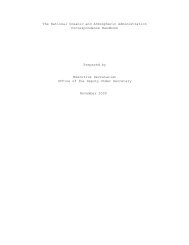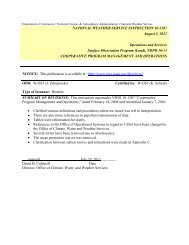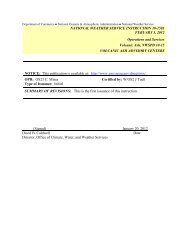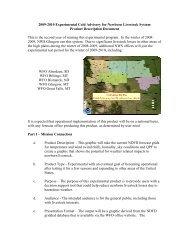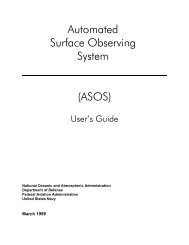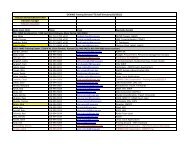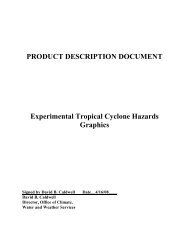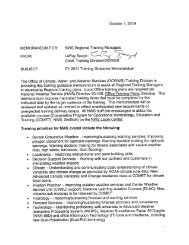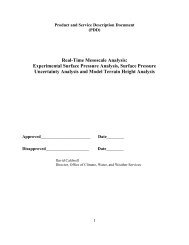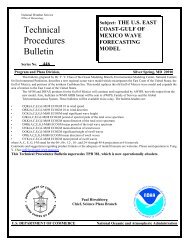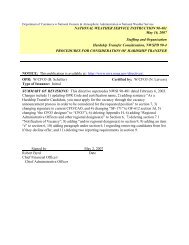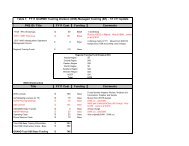Section 7: Outreach and Education Activities - NOAA
Section 7: Outreach and Education Activities - NOAA
Section 7: Outreach and Education Activities - NOAA
Create successful ePaper yourself
Turn your PDF publications into a flip-book with our unique Google optimized e-Paper software.
� Do not stop on a freeway or heavily traveled road. If your vehicles stalls or becomes disabled, get out <strong>and</strong> move<br />
away from the vehicle to avoid personal injury.<br />
� Consider postponing your trip until the fog clears. Usually by late morning or during the afternoon, visibilities improve.<br />
Heat Wave Safety Rules<br />
� Slow down. Strenuous activities should be reduced, eliminated or rescheduled to the coolest time of the day. Individuals<br />
at risk should stay in the coolest available place, not necessarily indoors.<br />
� Dress for summer. Lightweight, light colored clothing reflects heat <strong>and</strong> sunlight <strong>and</strong> helps your body maintain normal<br />
temperatures.<br />
� Try not to eat as much. Foods that increase metabolic heat production also increase water loss. Drink plenty of water<br />
or other non-alcoholic fluids. Your body needs water to keep cool. Drink plenty of fluids even if you do not feel<br />
thirsty (unless your physician has directed otherwise).<br />
� Do not drink alcoholic beverages. This is the same advice given for extremely cold weather. Alcoholic beverages<br />
will constrict the blood vessels, which will prevent adequate blood circulation to remove excess heat.<br />
� Spend more time in air-conditioned places. Air conditioning in homes <strong>and</strong> other buildings markedly reduces danger<br />
from the heat. If you cannot afford an air conditioner, spending some time each day (during hot weather) in an airconditioned<br />
environment affords some protection.<br />
� Do not get too much sun. Sunburn makes the job of heat dissipation that much more difficult.<br />
� Do not leave your children or pets alone inside automobiles during extremely hot days. The temperature inside vehicles<br />
can climb rapidly <strong>and</strong> may exceed 100 degrees.<br />
� Do not take salt tablets unless specified by a physician.<br />
Lightning Safety Rules<br />
� Do not use corded telephones except for emergencies.<br />
� Avoid contact with computers or any equipment connected to electrical power.<br />
� Avoid plumbing <strong>and</strong> water, including showers, baths, sinks <strong>and</strong> faucets.<br />
� Remain inside until 30 minutes after the last rumble of thunder.<br />
� If you are caught outside <strong>and</strong> absolutely cannot get to a substantial shelter, avoid projecting above the surrounding<br />
l<strong>and</strong>scape, such as st<strong>and</strong>ing on a hilltop.<br />
� In a forest, seek shelter in a low area under a thick growth of small trees. In open areas, go to a low place such as a<br />
ravine or valley.<br />
� Get away from open water, tractors <strong>and</strong> other metal farm equipment <strong>and</strong> small metal vehicles such as motorcycles,<br />
bicycles or golf carts.<br />
� Avoid wire fences, clotheslines, metal pipes <strong>and</strong> rails. Put down golf clubs.<br />
� Lightning victims do not carry an electrical charge. If someone is struck by lightning, call 911 for help <strong>and</strong> begin<br />
CPR if necessary.<br />
6



